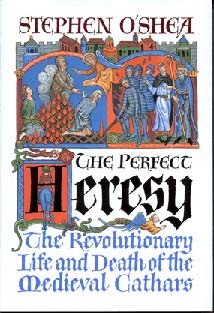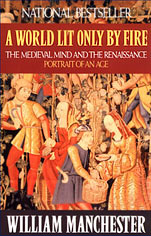Author William Manchester recently passed away which has prompted me to re-read some of his books. One favorite is A World Lit Only by Fire : The Medieval Mind and the Renaissance – Portrait of an Age. Manchester is often accused of being a “popular” historian, more focused on narrative than getting his facts straight. To these detractors I say, phooey. Unlike many history books which are the world’s best cure for insomnia, A World Lit Only By Fire is highly readable, entertaining, and enlightening. Manchester paints a grimly realistic picture of what life was like in the middle ages including the stench, the violence, and the pervasive Roman Catholic Church. He shows the seeds and the blossoming of the Renaissance – the combination of technology (printing press), brilliant enlightened minds (such as Erasmus and DaVinci), and Papal funding that brought about a full scale shift in the consciousness of the Western world.
Category Archives: History
The Shadow of the Sun – Ryszard Kapuscinski
My father first introduced me to the works of Ryszard Kapuscinski through The Emperor, Kapuscinski’s unnerving examination of Emperor Haile Selassie’s rule in Ethiopia told through the eyes of former members of Selassie’s court. With The Shadow of the Sun, Kapuscinski spreads his journalist reach throughout the continent of Africa revealing its mosaic of cultures, histories, tribal worldviews and indomitable geography. Kapuscinski is Poland’s most renowned journalist. First arriving in Africa in 1957, he lived there off and on for 40 years observing countless coups and managing to contract malaria as well as tuberculosis. Unlike most European visitors who kept to the safe, wealthy areas, Kapuscinski wanted to know how everyday people – tradesmen, bus drivers, medical aides – lived. In this book Kapuscinski describes the centuries old conflict between the Hutus and the Tutsis that resulted in the extraordinary genocide the world observed in the 90s. He writes of the fundamental differences in how people of different African tribes view themselves in relation to the rest of the world, and how these differences often lead to tragedy incomprehensible to the Western mind. Also revealing was the history of the former American slaves who founded Liberia in the early 1800s only to enslave the surrounding local population for the next 100 years.
The Perfect Heresy – Stephen O’Shea

The Cathars were a sect of renegade Christians in the late 12th century in what is now Southern France. They were pacifist vegetarians who shunned materialism, believed in the equality of women, thought the Catholic church had no God-given authority, and believed Jesus was more mythological than historical. Their popular and growing belief system was such a threat to the Catholic church that the church launched an all out assault for a hundred years to stamp them out, thus giving birth to the inquisition. Pope Innocent III, the same pope that granted legitimacy to St. Francis of Assisi and St. Dominic, paves the way for hundreds of years of future brutal repression by endowing Simon de Montfort with the task to make war on the cities who harbor Cathars. Stephen O’Shea’s recounts this history in The Perfect Heresy, a compelling story filled with medieval warfare, atrocities, courage and ultimate despair as the last Cathar leader is burned. This was a great read. I could not put it down.
Thank you to Mark Vestrich for this recommendation!

